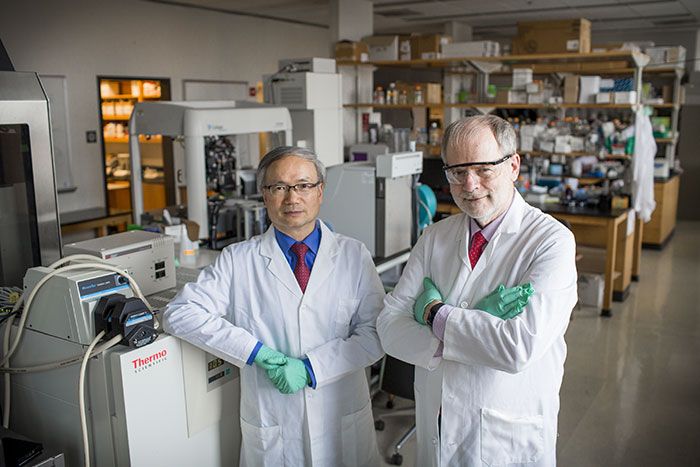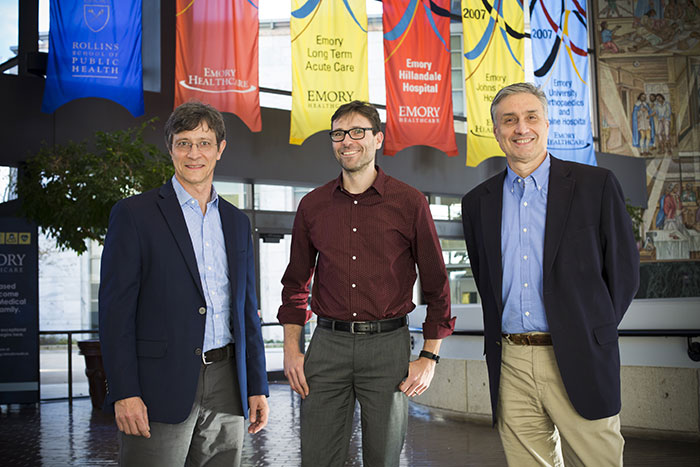Research in the basic sciences traditionally has been a solitary enterprise.
Yet scientists recognize that challenging problems can be better addressed by teams that bring together researchers with complementary skills. For some time, Emory has been ahead of that curve, demonstrating the difference that a collaborative culture can make.
And it’s about to get even better.
Pillar Three of the One Emory strategic framework, “Innovation through Scholarship and Creative Expression,” includes a call to increase the impact of basic scientific research across the university.
Dwight A. McBride, provost and executive vice president for academic affairs, and Jonathan Lewin, executive vice president for health affairs, asked Michael Elliott, dean of Emory College of Arts and Sciences, and Vikas Sukhatme, dean of the Emory School of Medicine, to appoint and charge a Task Force on the Future of Basic Sciences Research that would identify priorities for investment through 2025.
“Emory has significant strengths in key areas of fundamental research,” says McBride, “but we are not yet taking full advantage of the synergies that can be created by linking complementary efforts across different Emory schools, departments and centers. We aim to catalyze and nurture growth in our research enterprise through investments that link scholarly domains across schools.”
The task force was co-chaired by Huw Davies, Asa Griggs Candler Professor of Chemistry, and Guido Silvestri, Georgia Research Alliance Eminent Scholar, interim chair of pathology and laboratory medicine and Yerkes National Primate Research Center director of microbiology and immunology. It comprised basic scientists from Emory College and the School of Medicine.
Its goals: recommend priority areas for investment in basic science to seed future research, collaboration and discovery; sharpen Emory’s competitiveness in key areas of global scientific focus; and provide exciting opportunities for students and postdocs to pursue meaningful research that translates into positive outcomes for individuals and populations.
“Emory’s scientific enterprise has been well-funded by government agencies and foundations, but as university leaders, we wanted to emphasize Emory’s commitment to university-wide fundamental research partnerships and to support that commitment through institutional funding,” says Lewin.
Emory has provided $5 million each to two priority research initiatives: “Biological Discovery through Chemical Innovation” and “From Molecular Pathogenesis to Global Pandemics.” This initial financial support is considered seed funding, with the teams aiming to generate additional external funding for research and student fellowships as their research progresses.
Biological Discovery through Chemical Innovation
This initiative is led by Davies and Haian Fu, associate dean of innovation and international strategies in the School of Medicine, chair of the Department of Pharmacology and Chemical Biology, and a research leader in the Winship Cancer Institute.
Biological Discovery through Chemical Innovation sits at a key intersection of biology, chemistry and human health in both discovery and training of new researchers. It deepens and facilitates the rapidly developing synergy that already exists at Emory among the three areas.
Its aim is to accelerate development of the next generation of research tools, effective and safe drugs, and diagnostic agents. The work includes high-throughput screening to discover small molecules that target proteins related to diseases, then chemically altering these small molecules to improve their properties either as drug candidates or as chemical tools to probe biology and validate potential drug targets. Using data processing and other technology, high-throughput screening speeds the analysis of millions of chemical and genetic tests, allowing researchers to rapidly identify active compounds, antibodies or genes important to a biomolecular pathway of interest.
“Many researchers in the School of Medicine are doing high-throughput screening, looking for potential biological targets for diagnostics or the development of therapeutics for particular diseases and disorders,” Davies says. “Chemists can connect with this work very well, experimenting with these biological targets to find chemical compounds that could alter them in beneficial ways.”
“Chemical biology is a multidisciplinary field that applies the power of chemistry to provide insights into biology's most fundamental aspects,” Fu says. “These insights will increase our understanding of human diseases and lead to more effective new medicines.”
National research centers led by Davies and Fu provide solid groundwork for what is to come. The National Science Foundation–funded Center for C-H Functionalization, directed by Davies, is an Emory-based consortium encompassing 15 major research universities across the country as well as industrial partners.
The Emory Chemical Biology Discovery Center, directed by Fu, is a member of the National Cancer Institute’s Chemical Biology Consortium and was initially supported by a National Institutes of Health (NIH) Roadmap initiative. Through collaboration with the NIH, the Emory center has built a powerful infrastructure for high-throughput small-molecule screening and validation of targets with chemical probes, as well as training the next generation of scientists.
“We can achieve more by combining resources and drawing from individual strengths,” Davies notes.
“The idea is to enhance molecular science at Emory broadly. The focus is not just on the potential for developing drugs, but on achieving more impactful basic science by deepening knowledge of biology and novel chemistry.”
From Molecular Pathogenesis to Global Pandemics
The second initiative is led by Silvestri, Jaap de Roode and Ken Moberg. De Roode is associate professor of biology in Emory College and an expert in host-parasite interactions. Moberg is associate professor of cell biology in the School of Medicine.
The project will take a comprehensive, cross-disciplinary approach to the threat of emerging and reemerging infectious diseases, cutting across “scales” of research, beginning with studies of the host-pathogen interaction, then defining novel targets for drugs and vaccines, and ultimately optimizing implementation of new preventive and therapeutic interventions.
“If you’re studying flu in humans, you’re not getting the full story because we get flu from pigs and birds,” explains de Roode. “Most researchers in infectious diseases are focused at one level.”
Epidemiologists study a disease across a population, for instance, while immunologists look at the effects of a pathogen on an individual’s immune system. Disease ecologists, meanwhile, explore how pathogens can spread through an environment, jumping among humans, livestock and wildlife.
“Teaming up researchers from different areas will give us the power to take on bigger questions and have more of an impact,” says de Roode. “We will gain more potential to predict outbreaks before they happen—or at least to respond more quickly to outbreaks when they occur.”
In addition to the expertise of scientists in Emory College, medicine, public health and Yerkes, Emory has the benefit of having the Centers for Disease Control and Prevention (CDC) adjacent to its campus, and Emory researchers have many ongoing collaborations with CDC scientists.
“I can think of no better place on the planet than Emory to formalize a comprehensive approach to emerging and reemerging infectious diseases,” de Roode says.
“It’s incredibly exciting to be part of this brand-new initiative that focuses on a fast-moving field of biomedical research and that also leverages existing strengths of our university,” says Silvestri. “The program will provide tremendous opportunities for transformative science in the areas of host-pathogen interaction, infectious diseases and vaccines. Ultimately, this will allow us to more effectively prevent emerging and reemerging infectious threats.”
Adds Moberg, “In looking around the world at new emerging pathogens, such as swine flu in China and Ebola in West Africa, this is an opportune time to take advantage of Emory synergies and get ahead of the game in better understanding pathogens and coming up with therapeutics. Our Emory strengths within medicine, the Vaccine Center, Yerkes, public health and the college can propel us to the forefront of this field. And an important component will be our partnership with CDC, with their boots on the ground in global pandemics and their goldmine of epidemiological data.”
“Deans Sukhatme and Elliott deserve a lot of credit for foresight and bravery to envision this initiative,” notes Moberg. “They’ve put their trust in us, and we really want to succeed and make a lasting impact in these fields of research.”


